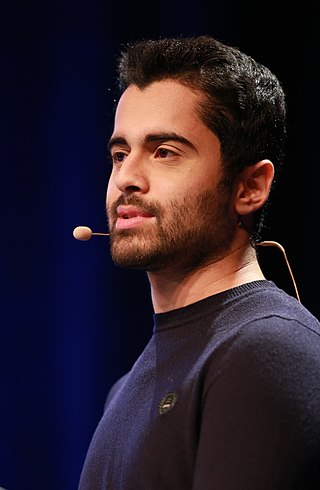
The Chaos Computer Club (CCC) is Europe's largest association of hackers with 7,700 registered members. Founded in 1981, the association is incorporated as an eingetragener Verein in Germany, with local chapters in various cities in Germany and the surrounding countries, particularly where there are German-speaking communities. Since 1985, some chapters in Switzerland have organized an independent sister association called the Chaos Computer Club Schweiz (CCC-CH) instead.

A hacker is a person skilled in information technology who achieves goals by non-standard means. The term has become associated in popular culture with a security hacker – someone with knowledge of bugs or exploits to break into computer systems and access data which would otherwise be inaccessible to them. In a positive connotation, though, hacking can also be utilized by legitimate figures in legal situations. For example, law enforcement agencies sometimes use hacking techniques to collect evidence on criminals and other malicious actors. This could include using anonymity tools to mask their identities online and pose as criminals.

Hacktivism, is the use of computer-based techniques such as hacking as a form of civil disobedience to promote a political agenda or social change. A form of Internet activism with roots in hacker culture and hacker ethics, its ends are often related to free speech, human rights, or freedom of information movements.

Cybercrime encompasses a wide range of criminal activities that are carried out using digital devices and/or networks. These crimes involve the use of technology to commit fraud, identity theft, data breaches, computer viruses, scams, and expanded upon in other malicious acts. Cybercriminals exploit vulnerabilities in computer systems and networks to gain unauthorized access, steal sensitive information, disrupt services, and cause financial or reputational harm to individuals, organizations, and governments.

Strategic Forecasting Inc., commonly known as Stratfor, is an American strategic intelligence publishing company founded in 1996. Stratfor's business model is to provide individual and enterprise subscriptions to Stratfor Worldview, its online publication, and to perform intelligence gathering for corporate clients. The focus of Stratfor's content is security issues and analyzing geopolitical risk.
Ransomware is a type of malware that encrypts the victim's personal data until a ransom is paid. They commonly use difficult-to-trace digital currencies such as paysafecard or Bitcoin and other cryptocurrencies are used for the ransoms, making tracing and prosecuting the perpetrators difficult. Sometimes the original files can be retrieved without paying the ransom due to implementation mistakes, leaked cryptographic keys or a complete lack of encryption in the ransomware.

A hackathon is an event where people engage in rapid and collaborative engineering over a relatively short period of time such as 24 or 48 hours. They are often run using agile software development practices, such as sprint-like design wherein computer programmers and others involved in software development, including graphic designers, interface designers, product managers, project managers, domain experts, and others collaborate intensively on engineering projects, such as software engineering.

Louise Daphne Mensch is a British blogger, novelist, and former Conservative Member of Parliament. In the 1990s she became known as a writer of chick lit novels under her maiden name Louise Bagshawe. She was elected Conservative MP for Corby at the 2010 UK general election.
Operation Aurora was a series of cyber attacks performed by advanced persistent threats such as the Elderwood Group based in Beijing, China, with associations with the People's Liberation Army. First disclosed publicly by Google on January 12, 2010, by a weblog post, the attacks began in mid-2009 and continued through December 2009.

The Office of Tailored Access Operations (TAO), now Computer Network Operations, and structured as S32, is a cyber-warfare intelligence-gathering unit of the National Security Agency (NSA). It has been active since at least 1998, possibly 1997, but was not named or structured as TAO until "the last days of 2000," according to General Michael Hayden.

Mustafa Al-Bassam is an Iraqi- British computer security researcher, hacker, and co-founder of Celestia Labs. Al-Bassam co-founded the hacker group LulzSec in 2011, which was responsible for several high profile breaches. He later went on to co-found Chainspace, a company implementing a smart contract platform, which was acquired by Facebook in 2019. In 2021, Al-Bassam graduated from University College London, completing a PhD in computer science with a thesis on Securely Scaling Blockchain Base Layers. In 2016, Forbes listed Al-Bassam as one of the 30 Under 30 entrepreneurs in technology.
The dark web is the World Wide Web content that exists on darknets that use the Internet but require specific software, configurations, or authorization to access. Through the dark web, private computer networks can communicate and conduct business anonymously without divulging identifying information, such as a user's location. The dark web forms a small part of the deep web, the part of the web not indexed by web search engines, although sometimes the term deep web is mistakenly used to refer specifically to the dark web.
Cyberwarfare is a part of the Iranian government's "soft war" military strategy. Being both a victim and wager of cyberwarfare, Iran is considered an emerging military power in the field. Since November 2010, an organization called "The Cyber Defense Command" has been operating in Iran under the supervision of the country's "Passive Civil Defense Organization" which is itself a subdivision of the Joint Staff of Iranian Armed Forces.

Carding is a term of the trafficking and unauthorized use of credit cards. The stolen credit cards or credit card numbers are then used to buy prepaid gift cards to cover up the tracks. Activities also encompass exploitation of personal data, and money laundering techniques. Modern carding sites have been described as full-service commercial entities.
The Lazarus Group is a hacker group made up of an unknown number of individuals, alleged to be run by the government of North Korea. While not much is known about the group, researchers have attributed many cyberattacks to them since 2010.

Bevil Wooding is a Trinidadian technologist and development strategist who is the Chief Knowledge Officer at Congress WBN, a UK-registered charity with operations in over 120 countries. He is known for his work in the field of Information and Communications Technology (ICT) in the Caribbean. In 2010, he was named by ICANN as one of the Trusted Community Representatives for the Domain Name System Security Extensions (DNSSEC) root. Wooding advocates for developing states and emerging economies to create policies, build infrastructure, and leverage human resource capacity for technology-enabled development. He has been described as "a visionary who believes that the Caribbean Economy can be enhanced through ICTs and Internet development.”
Hamza Bendelladj is an Algerian cyberhacker and carder who goes by the code name BX1 and has been nicknamed the "Smiling Hacker".
Hack Forums is an Internet forum dedicated to discussions related to hacker culture and computer security. The website ranks as the number one website in the "Hacking" category in terms of web-traffic by the analysis company Alexa Internet. The website has been widely reported as facilitating online criminal activity, such as the case of Zachary Shames, who was arrested for selling keylogging software on Hack Forums in 2013 which was used to steal personal information.











